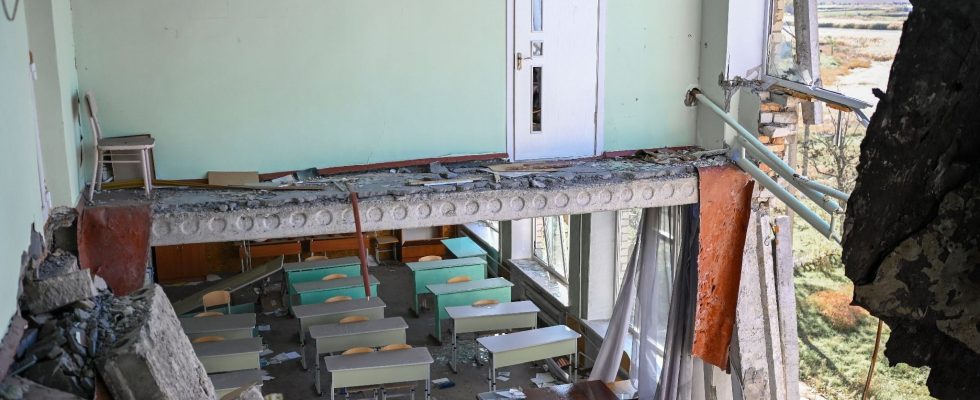Schools in ruins, floors strewn with excrement and classrooms sprayed with messages hostile to Ukrainians. In his new reportthe NGO Human Rights Watch (HWR) documents the state of school infrastructures occupied by the Russian army and used for military purposes, or even completely destroyed, since the invasion of Ukraine.
In total, 3,428 establishments have been damaged and 365 have been completely destroyed since 2022, according to the Ukrainian government. For the NGO’s researchers, it is still difficult to determine whether these schools were deliberately targeted by the armed forces. “But many of the schools we went to were damaged or destroyed because soldiers were inside,” points out Yulia Gorbunova, co-author of the report.
Torture rooms and looting
Since 2014, many schools and kindergartens in Ukraine have lived in the rhythm of war, and have been used in turn by Russian and Ukrainian soldiers. But, since 2019, after kyiv signed the declaration on school safety, the Ukrainian authorities have been working to preserve establishments from war. Russia, which did not sign this declaration, is today responsible for the majority of destruction committed in educational establishments, says the report.
Russian bombings in the Kharkiv and Chernihiv regions affected, for example, establishments that were not used for military purposes. In several schools – some of which specialized in welcoming children with disabilities – rooms for torturing and detaining civilians were discovered after their reconquest by the Ukrainian army. And systematic looting took place: computers, televisions, electronic boards, refrigerators, school equipment or heating systems… Which, according to international law, could constitute war crimes.
Psychological impact
In addition to material destruction, the ravages of war on school grounds significantly affect the well-being of children and teachers. According to a national survey conducted between December 2022 and January 2023, 72% of Ukrainian parents say their children need additional measures to compensate for educational gaps in terms of knowledge and skills linked to a school curriculum disrupted by the war, notes the HRW report. Teachers are under pressure: some report acute post-traumatic stress and an alarming overload of work.
Children attending schools that have been damaged or destroyed are often transferred to other settings or forced to have shortened school days and study in shifts. Those who reside in areas of active hostilities and lack transportation are taking distance learning courses.
A rhythm that disrupts the daily lives of the youngest, although they were able to adapt more quickly than expected. “In a way, thanks to the Covid-19 pandemic, the education system was immediately able to resurrect online learning methods, notes Belkis Wille, co-author of the report. Thanks to the experience of the pandemic, the children were able to return to classes very quickly,” even though power and Internet outages in the country are frequent.
Reconstructions vary depending on the region
In Ukraine, as is the case with any infrastructure damaged by explosions or gunfire, the authorities are rushing to rebuild schools. But the restoration work varied greatly depending on the region, notes the report. While 71% of schools in the Kiev region and surrounding areas have been rebuilt, those in Kharkiv Oblast, for example, have benefited less from state efforts, with only 16 schools restored out of the 296 affected. “It is more difficult to rebuild a building that could quickly be destroyed again,” explains Belkis Wille.
The territories still under Russian occupation remain a “black zone” for Human Rights Watch, which is already preparing a special investigation into this issue. “We were able to speak to teachers who fled the occupation and tell us that the authorities have put in place Russian school programs,” reports Yulia Gorbunova. In a school located a few dozen kilometers from Izioum, in the Borova region, occupied for several months, “the forces of Moscow took away all the literature in the Ukrainian language, a teacher told HRW. They wrote on the board […] : ‘Putin is our president, Ukrainians and Russians form one people!'” Whether intentional targets or not, Ukraine’s schools bear the indelible scars of war.
.
